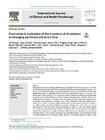Psychometric evaluation of the inventory of dimensions of emerging adulthood (IDEA) in China

Abstract
Abstract
Background/Objective
Emerging adulthood (EA, age range between 18 to 29 years) is an important developmental stage that is characterized by marked social and psychological changes. Currently, its developmental features are quantified by the Inventory of the Dimensions of Emerging Adulthood (IDEA) but a validated Chinese version of this questionnaire (IDEA-C) is lacking. Thus, this research, which consists of two consecutive studies, aimed to investigate the psychometric properties of the translated IDEA in a Chinese sample of emerging adults.
Method
Firstly, a forward-backward translation of the IDEA-C scale was conducted. Item analysis and exploratory factor analysis were performed in Sample 1a (n = 2438), followed by structural validity test in Sample 1b (n = 2461). Concurrent validity and internal consistency were evaluated in Sample 1(n = 4899). Finally, test-retest reliability was tested in Sample 2 (n = 185). Then, the second study aimed to test the factor structure proposed by study 1 in the non-student sample (n = 2200) by confirmatory factor analysis. In addition, the second study also investigated whether the attainment of college education influenced the EA experience of non-student emerging adults in China. And the association was examined between the socioeconomic status of emerging adults and the subscales of IDEA.
Results
In the college sample, the IDEA-C scale presented a four-factor structure different from the original five-factor structure (χ2(190)=1116.84, p < 0.001; CFI = 0.97; TLI = 0.96; SRMR = 0.039; RMSEA = 0.050 [90%CI=0.047-0.052]). In addition, IDEA-C exhibited good internal consistency reliability (Cronbach's alpha >0.77), test-retest reliability (r>0.49, p < 0.01) and concurrent validity. And the CFA in non-student sample also showed an adequate fit indices (χ2(158) =710.10, p < 0.001, TLI=0.93, CFI=0.94, SRMR=0.038, RMSEA=0.04 [90%CI=0.037-0.040]) and an adequate internal consistency (Cronbach's alpha >0.64) and test-retest reliability (r>0.43, p < 0.01).
Conclusion
The results of the present study confirmed that the Chinese version of the IDEA is found to be valid for measuring psychological characteristics of EA in Chinese-speaking samples of emerging adults.
Collections
Date
2023-01Author
Kuang, Jin
Zhong, Juan
Yang, Peiying
Bai, Xinran
Liang, Yinglan
Cheval, Boris
Herold, Fabian
Wei, Gaoxia
Taylor, Alyx
Zhang, Jieting
Chen, Chun
Sun, Jing
Zou, Liye
Arnett, Jeffrey Jensen